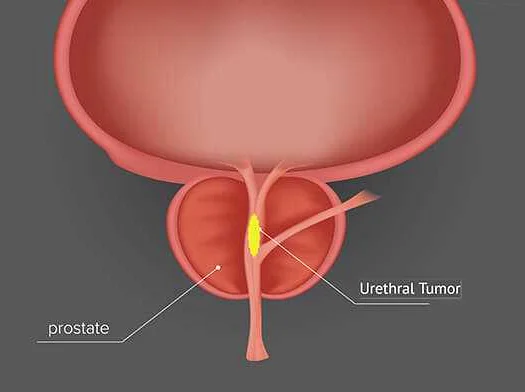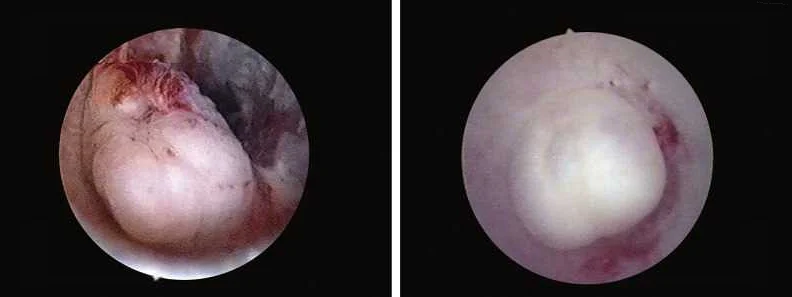Urethral Cancer: Causes, Symptoms, and Treatment
Содержимое
Urethral cancer is a rare type of cancer that affects the urethra, the tube that carries urine from the bladder to outside the body. This article provides an overview of urethral cancer, including its causes, symptoms, diagnosis, and treatment options. Learn more about this condition and how it can be managed.
Urethral cancer is a rare form of cancer that affects the urethra, the tube that carries urine from the bladder to the outside of the body. This type of cancer is more common in men than in women and typically occurs in older individuals. Urethral cancer can be challenging to diagnose due to its location and the non-specific nature of its symptoms. However, early detection and treatment can significantly improve outcomes.
Symptoms of urethral cancer can vary depending on the location and stage of the cancer. Common symptoms include:
- Blood in the urine
- Pain or burning during urination
- Frequent urination
- Weak urine flow
- Pelvic pain
- Urethral discharge
If you experience any of these symptoms, it is important to consult a healthcare professional for an accurate diagnosis.
Diagnosing urethral cancer involves several steps, including:
- Medical history review and physical examination
- Urine tests to check for blood or abnormal cells
- Imaging tests, such as CT scans or MRI, to visualize the urethra and surrounding structures
- Biopsy, where a small tissue sample is taken for laboratory analysis
Treatment options for urethral cancer depend on the stage and location of the cancer, as well as the overall health of the patient. Common treatment modalities for urethral cancer include:
- Surgery to remove the tumor and any affected surrounding tissues
- Radiation therapy to target and destroy cancer cells
- Chemotherapy to kill cancer cells throughout the body
In some cases, a combination of these treatments may be used to achieve the best possible outcome. Ongoing monitoring and follow-up care are essential to detect any recurrence or potential complications.
In conclusion, urethral cancer is a rare but significant condition that requires prompt diagnosis and appropriate treatment. Awareness of the symptoms, early detection, and timely intervention can greatly improve the prognosis for individuals with urethral cancer.
Urethral Cancer

Urethral cancer is a rare form of cancer that affects the urethra, the tube that carries urine from the bladder to the outside of the body. It predominantly occurs in older adults, and is more common in men than in women.
Symptoms of urethral cancer may include blood in the urine, pain or discomfort during urination, frequent urination, or a lump or growth in the urethra. However, many of these symptoms can also be caused by other conditions, so it is important to see a healthcare provider for an accurate diagnosis.
Diagnosing urethral cancer typically involves a physical examination, as well as various imaging tests, such as an ultrasound or MRI. A biopsy may also be performed to determine the presence of cancerous cells.
Treatment options for urethral cancer depend on the stage and location of the cancer. Surgery is often the primary treatment, and may involve removing a portion of the urethra or the entire organ. Radiation therapy and chemotherapy may also be used to target and kill cancer cells.
Recovery and prognosis for urethral cancer can vary depending on the stage of the cancer and the individual’s overall health. It is important to work closely with a healthcare team to develop an appropriate treatment plan and to receive ongoing support and monitoring during and after treatment.
It is important to remember that urethral cancer is rare, and having some of the symptoms mentioned does not necessarily mean that you have the disease. However, it is important to consult with a healthcare provider if you are experiencing any concerning symptoms or have any questions or concerns.
Recognizing the Symptoms
Urethral cancer is a rare form of cancer that affects the urethra, the tube that carries urine from the bladder to the outside of the body. It can be difficult to diagnose, as the symptoms may be similar to those of other urinary conditions. However, recognizing the symptoms early on is crucial for a timely diagnosis and effective treatment.
Common symptoms of urethral cancer include:
- Blood in the urine (hematuria)
- Pain or burning during urination
- Urinary frequency or urgency
- Weakening of the urine stream
- Persistent pelvic pain
- Lump or swelling in the urethra
- Enlarged lymph nodes in the groin area
If you experience any of these symptoms, it is important to see a healthcare professional for further evaluation. Keep in mind that these symptoms can also be caused by other conditions, such as urinary tract infections or kidney stones. However, it is always better to err on the side of caution and seek medical advice.
Your healthcare provider may perform a physical examination and order additional tests to determine the cause of your symptoms. These may include urine tests, imaging studies (such as ultrasound or MRI), or a biopsy of the urethral tissue.
Early detection of urethral cancer can greatly improve the chances of successful treatment. If you have any concerns about your urinary health or notice any unusual symptoms, don’t hesitate to reach out to a healthcare professional.
Diagnosis and Screening

Urethral cancer is often diagnosed through a combination of tests and examinations. Some of the common diagnostic methods for urethral cancer include:
- Physical Examination: A healthcare professional will perform a physical examination to check for any abnormalities or lumps in the urethra or surrounding areas.
- Urinalysis: A urine test may be conducted to check for the presence of blood or abnormal cells.
- Imaging Tests: Imaging tests such as CT scans, MRI scans, or ultrasound may be used to create detailed images of the urethra and surrounding tissues.
- Cystoscopy: A cystoscope, a thin tube with a camera on the end, is inserted into the urethra to examine the inside of the urethra and bladder.
- Biopsy: If abnormal tissues are found during a cystoscopy, a biopsy may be performed to collect a small sample of tissue for further examination under a microscope.
Screening for urethral cancer is not a routine practice, as this type of cancer is rare. However, individuals with risk factors such as a history of bladder or urethral cancer, long-term catheter use, or smoking may be recommended for regular screenings and monitoring. It is important for individuals with any persistent or unusual symptoms to consult a healthcare professional for proper diagnosis and evaluation.
Treatment Options
There are several treatment options available for urethral cancer, depending on the stage and severity of the disease. The main goals of treatment are to remove the cancerous tissue, prevent its spread, and preserve as much of the normal function of the urethra as possible.
The choice of treatment options will be determined by a multidisciplinary team of healthcare professionals, including urologists, oncologists, and radiation therapists. They will take into account factors such as the size and location of the tumor, the presence of any metastasis, and the overall health and preferences of the patient.
The most common treatment options for urethral cancer include:
| Surgery | Surgical removal of the cancerous tissue is the primary treatment for urethral cancer. The extent of surgery will depend on the stage and location of the tumor. In some cases, a partial urethrectomy may be performed to remove only a portion of the urethra. In more advanced cases, a radical urethrectomy may be necessary, which involves the complete removal of the urethra. |
| Radiation therapy | Radiation therapy uses high-energy rays to kill cancer cells. It may be used before surgery to shrink the tumor, after surgery to kill any remaining cancer cells, or as the primary treatment if surgery is not an option. External beam radiation therapy and brachytherapy are the two main types of radiation therapy used for urethral cancer. |
| Chemotherapy | Chemotherapy involves the use of drugs to kill cancer cells. It may be used in combination with surgery or radiation therapy to improve the effectiveness of treatment. Systemic chemotherapy, which circulates throughout the body, is typically used for urethral cancer. |
| Immunotherapy | Immunotherapy stimulates the body’s immune system to fight cancer cells. It may be used in combination with other treatments or as a standalone treatment for urethral cancer. Immune checkpoint inhibitors and Bacillus Calmette-Guérin (BCG) therapy are two types of immunotherapy commonly used for urethral cancer. |
The choice of treatment will depend on individual factors, and each patient’s treatment plan will be tailored to their specific needs. It is important for patients to discuss the potential benefits and risks of each treatment option with their healthcare team to make informed decisions about their care.
Minimally Invasive Procedures

In recent years, minimally invasive procedures have become increasingly popular for the treatment of urethral cancer. These procedures offer several advantages over traditional open surgery, including smaller incisions, less postoperative pain, reduced blood loss, and faster recovery times.
One minimally invasive procedure commonly used for urethral cancer is transurethral resection (TUR). During this procedure, a thin, flexible instrument called a cystoscope is inserted through the urethra to remove the tumor. TUR is typically performed under general anesthesia and may be used for both diagnostic and therapeutic purposes.
Another minimally invasive procedure is laser ablation. This technique uses a high-energy laser to destroy cancerous tissue. Laser ablation can be performed through a cystoscope or with the assistance of imaging guidance, such as ultrasound or MRI. This procedure is less invasive than open surgery and may be a suitable option for patients with small, localized tumors.
Cryotherapy is another minimally invasive treatment option for urethral cancer. This technique involves freezing the cancer cells using liquid nitrogen or argon gas. Cryotherapy can be performed through a cystoscope or with the aid of imaging guidance. It is often used as a palliative treatment to relieve symptoms or in combination with other therapies, such as radiation or chemotherapy.
| Transurethral resection (TUR) | – Smaller incisions – Less postoperative pain – Reduced blood loss – Faster recovery times |
| Laser ablation | – Less invasive than open surgery – Suitable for small, localized tumors |
| Cryotherapy | – Can be performed through a cystoscope or with imaging guidance – Used as a palliative treatment or in combination with other therapies |
It is important to note that not all patients with urethral cancer are candidates for minimally invasive procedures. The suitability of these procedures depends on various factors, including the size and location of the tumor, the stage of the cancer, and the patient’s overall health. A thorough evaluation by a urologist or oncologist is necessary to determine the most appropriate treatment approach for each individual case.